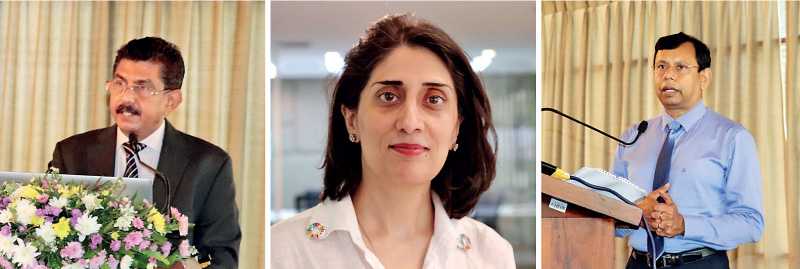Wednesday Feb 18, 2026
Wednesday Feb 18, 2026
Wednesday, 3 March 2021 00:00 - - {{hitsCtrl.values.hits}}

Ministry of Environment Secretary Dr. Anil Jasinghe, UNDP DRR Faiza Effendi, IUCN Country Representative Dr. Ananda Mallawatantri
Sri Lanka is globally recognised for its remarkable biodiversity, with 30% of its land designated as protected areas – the highest national coverage in Asia. The benefits of Sri Lanka’s biodiversity directly contribute towards the forestry, fisheries, agriculture and tourism sectors. However, habitat modification through human activities in surrounding landscapes and seascapes, national policies, and the activities of people in different production and development sectors are posing threats to the effective conservation of Sri Lanka’s biodiversity.
In order to introduce and establish a holistic approach to incorporating biodiversity conservation into planning and implementation processes, the inception workshop of the ‘Managing Together: Integrating community-centred, ecosystem-based approaches into forestry, agriculture and tourism sectors’ project by the Ministry of Environment together with the United Nations Development Programme (UNDP) in Sri Lanka funded by the Global Environment Facility (GEF) and implemented by the International Union for Conservation of Nature (IUCN) Sri Lanka was held recently.
The project which will be implemented in the Malwathu Oya Basin of north-west Sri Lanka, will address the requirements of wild species and humans through biodiversity mainstreaming and conservation landscape design, accompanied by a community-centred land-use plan with livelihood-focused interventions at the village scale. The project expects to reduce direct threats to biodiversity through integrated, ecologically sensitive planning and decision-making in natural resource management, and tourism that protects biodiversity, reduces resource conflicts, and maintains ecosystem services.
Addressing participants at the meeting, Ministry of Environment Secretary Dr. Anil Jasinghe stated, “This project brings together the strengths of all systems. The Government, UNDP and IUCN will work together to make this a success by incorporating stakeholders’ plans and linking biodiversity conservation with socio-economic benefits to the community. It’s important to look beyond the project life span. We have to ensure that each intervention will have a lasting impact on the lives and livelihoods of the communities living in the Malwathu Oya basin. Further, we ourselves have to be accountable for the resources available and this needs to be utilised in effective and efficient ways, so that we can assure that the trust placed on us by the donors is worthy. To ensure that, the monitoring and evaluation of the project outputs are essential.”
The project will work with national institutions to include existing in-service and pre-service training programs to ensure that biodiversity and ecosystem ‘mainstreaming’ takes place; where biodiversity and ecosystem services are routinely considered in decision-making processes and acted on across all sectors. At district and divisional levels, the project will work with the Government and civil society across multiple sectors and jurisdictions to mainstream biodiversity conservation into natural resource management and land-use planning.
Speaking at the workshop via Zoom, UNDP Sri Lanka Deputy Resident Representative Faiza Effendi stated, “For over 25 years, UNDP has played the role of an accredited agency for GEF funding in Sri Lanka. This project achieves a new milestone in this history of our support to the Government of Sri Lanka with the involvement of IUCN from its inception. From project design to implementation, the collaborative efforts of all partners of the project will enable the country to build on the knowledge and experiences related to sustainable environmental management, and harness the strengths of ground level project implementation while advocating for favourable change.”
With participants joining both online and offline, the inception workshop provided a platform for all project stakeholders to understand and take ownership of the ‘Managing Together’ project, and formally launch it. The workshop explored areas such as landscape level biodiversity management, monitoring and evaluation guidelines and project workplans, among others.
Speaking of their role as an implementing partner of the project, IUCN Sri Lanka Country Representative Dr. Ananda Mallawatantri stated, “IUCN will bring in proven global tools and knowledge to enrich the process. This novel ‘managing together’ approach would provide solutions to multiple development issues, including water related health problems, the human-elephant conflict, poverty led deforestation, loss of coastal coral and seagrass due to over exploitation, among others. Improved understanding of ecosystems and social issues, and inclusive landscape planning is timely and is also very much in line with the Vistas of Prosperity and Splendour.”
Set to be completed by January 2025, the project aims to implement a long-term monitoring program to track the impacts of the landscape approach, make necessary adjustments based on results and establish a dissemination program to encourage the adoption of this modified approach in other parts of the country, and realise Sri Lanka’s biodiversity priorities in this decade of action as we work towards achieving the Sustainable Development Goals (SDGs).